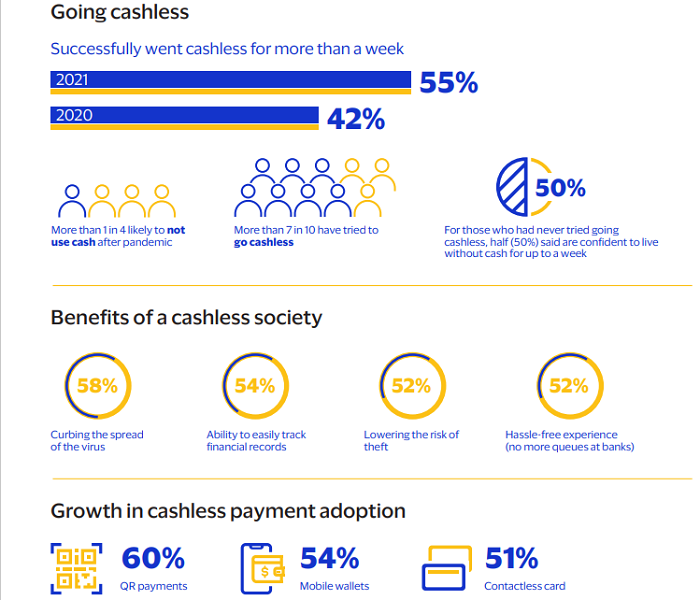Visa: 55% Malaysians can go without cash for more than a week as digital payment usage increases
By Digital News Asia January 13, 2022
- Increased preference to shop at merchants that accept cashless payment options
- Visa concludes shift to using more digital payments in Malaysia is here to stay

Visa has today released findings from its latest Visa Consumer Payment Attitudes study that show slightly over half (55%) of Malaysian consumers can successfully live for more than a week without using cash. This represents a 13% increase compared to 2020.
(The Visa Consumer Payment Attitudes Study was conducted by CLEAR on behalf of Visa in September 2021 across eight Southeast Asian countries: Cambodia, Indonesia, Malaysia, Philippines, Singapore, Thailand, and Vietnam. The total sample size is 7,500 including 1,000 consumers in Malaysia aged 18-65, with a minimum income cut-off of US$479 or RM2,000)
The pandemic has also prompted Malaysian consumers to choose digital payments over cash in the longer term, where more than one in four respondents (28%) said they are likely not to use cash after the pandemic.
 “It is clear that events in the past years have caused a significant change in the way we live and work. The pandemic has accelerated digital transformation and how Malaysians choose to pay and be paid,” said Ng Kong Boon, Country Manager for Visa Malaysia.
“It is clear that events in the past years have caused a significant change in the way we live and work. The pandemic has accelerated digital transformation and how Malaysians choose to pay and be paid,” said Ng Kong Boon, Country Manager for Visa Malaysia.
He adds that Visa is following the change in consumer behaviour closely and has come to the conclusion, based from insights gathered from the study over the years, that “the shifts towards using more digital payments in Malaysia are here to stay.”
More than seven in 10 Malaysians (74%) have tried going cashless over the past year. Half (50%) said they are confident to live their daily lives without cash for up to a week.
Malaysian consumers believe the pandemic has accelerated the time it will take for the country to become a cashless society. In the current circumstances, they believe a cashless society could be a possibility by 2025 instead of 2028, which would have happened under the pre-pandemic era.
In addition, Malaysians believe that a cashless society also brings a number of benefits such as curbing the spread of the virus (58%), providing users with the ability to track financial records easily (54%), lowering the risk of theft (52%), offering users a hassle-free experience, eliminating the need to queue at banks (52%), among others.
The study also revealed that there is a growth in cashless payment adoption, especially via QR payments (60%), mobile wallets (54%), and contactless cards (51%). This is primarily seen in categories such as bill payments, supermarket, retail shopping, purchases at convenience stores, and food and dining.
There is also an increased preference among consumers to shop at merchants that accept cashless payment options instead of cash only options. There is also high interest towards cashless innovations such as self-service checkouts (64%), automated app payments (64%), and biometric payments through fingerprint or facial authentication (60%).
“We are excited to see a significant shift in consumer behaviours and the nation becoming a less-cash society. We will continue to work with our clients and stakeholders in the industry to leverage the power of our network to enable individuals, businesses and economies to thrive,” Kong Boon concluded.
Related Stories :


